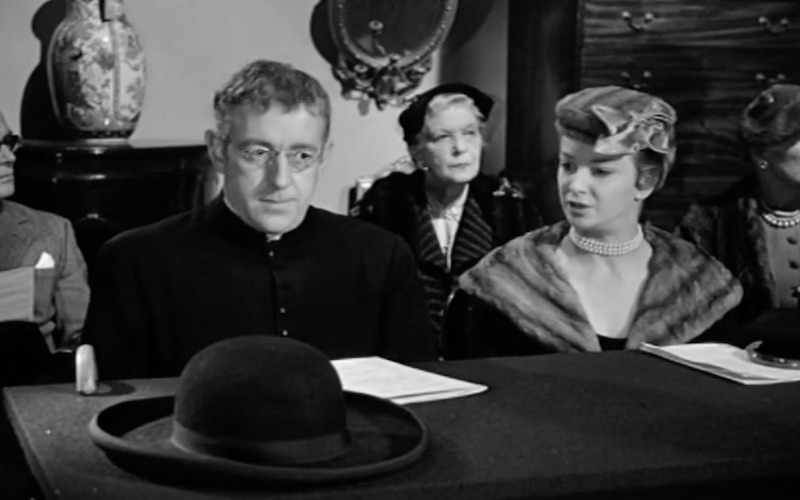Father Brown (1954)
US Title: The Detective

The GK Chesterton Father Brown stories have been adapted a few times now, mostly notably the BBC series with Mark Williams and Sorcha Cusack. It also inspired TV’s Father Dowling Mysteries, among others. They’re slight tales—short stories really—which feature intuition rather than deduction and have a strong sense of morality. The most commonly adapted individual story has been ‘The Blue Cross’, featuring Brown’s nemesis, Flambeau, an international thief/cat burglar akin to Raffles. This is the story used here, although only the first act of the film follows the plot of the novella. While deviating from plot, the film sticks fairly close to Chesterton’s tone and themes.
The movie opens with Father Ignatius Brown (Guinness, perfectly cast) as a Catholic parish priest who has been picked up by the police for being ‘on enclosed premises for a burglarious purpose’, which is a glorious thing to be charged with, although the priest claims that he was merely returning goods which a parishioner had previously stolen. When the mistake is cleared up and the police accept his version of events, he seeks out said parishioner, Bert Parkinson (James). Rather than turning Bert over to the police, Father Brown tells him off for being ‘clearly incapable of making a dishonest living’ and instead sets Bert up with a chauffeur’s job for Lady Warren (Greenwood). He wants Bert to have a purpose which keeps him away from crime and for Lady Warren to start coming out of her shell, having been in mourning for over two years.
The main plot, however, concerns Brown and notorious cat burglar, Gustave Flambeau (Finch, looking very distinguished), a human chameleon who has been stealing priceless treasures across Europe for over ten years. Father Brown is charged with protecting the blue cross of the source novella’s title, the Holy Cross of St Augustine, from being stolen on its way to Rome. Brown doesn’t succeed, but he does engage Flambeau for the first time, setting in train a cat and mouse pursuit back and forth between England and France, with Brown being ably abetted at times by Lady Warren in setting traps to catch him.
Brown is meanwhile being hounded by his bishop (Parker) for his professional failings in losing the cross, which might lead to his being expelled from the priesthood, and by detectives from both the local British police (Lee, best known as M from the Bond films) and the French Sûreté (Oury) who object to his amateur sleuthing and obviously want to catch Flambeau themselves.
Guinness is a delight as the myopic amateur detective who is more concerned for people’s souls than legal justice, and the film reawakened his own Christianity (as a younger man, he had considered becoming an Anglican priest) and he converted to Catholicism shortly thereafter. The religious elements are not overplayed; they are part of the film because they are at the core of who Father Brown is as a man and are what motivates him as a detective. His knowledge of people, gained from the confessional, is his guide, making him a bit of an early profiler some twenty years before the FBI codified those techniques. During the Burgundy scenes, it looks as if they are setting Flambeau up to be a noble criminal—and, indeed, a lesser (modern) movie would have done so—but they leave us in no doubt that he has been venal and callow, underscoring the message that all souls are worth saving, not just the good ones.
The film itself is as gentle and amusing and enjoyable as its main character. Unusually for the time, the location scenes in Paris and Burgundy were actually shot in Paris and Burgundy, and not a Pinewood sound stage.